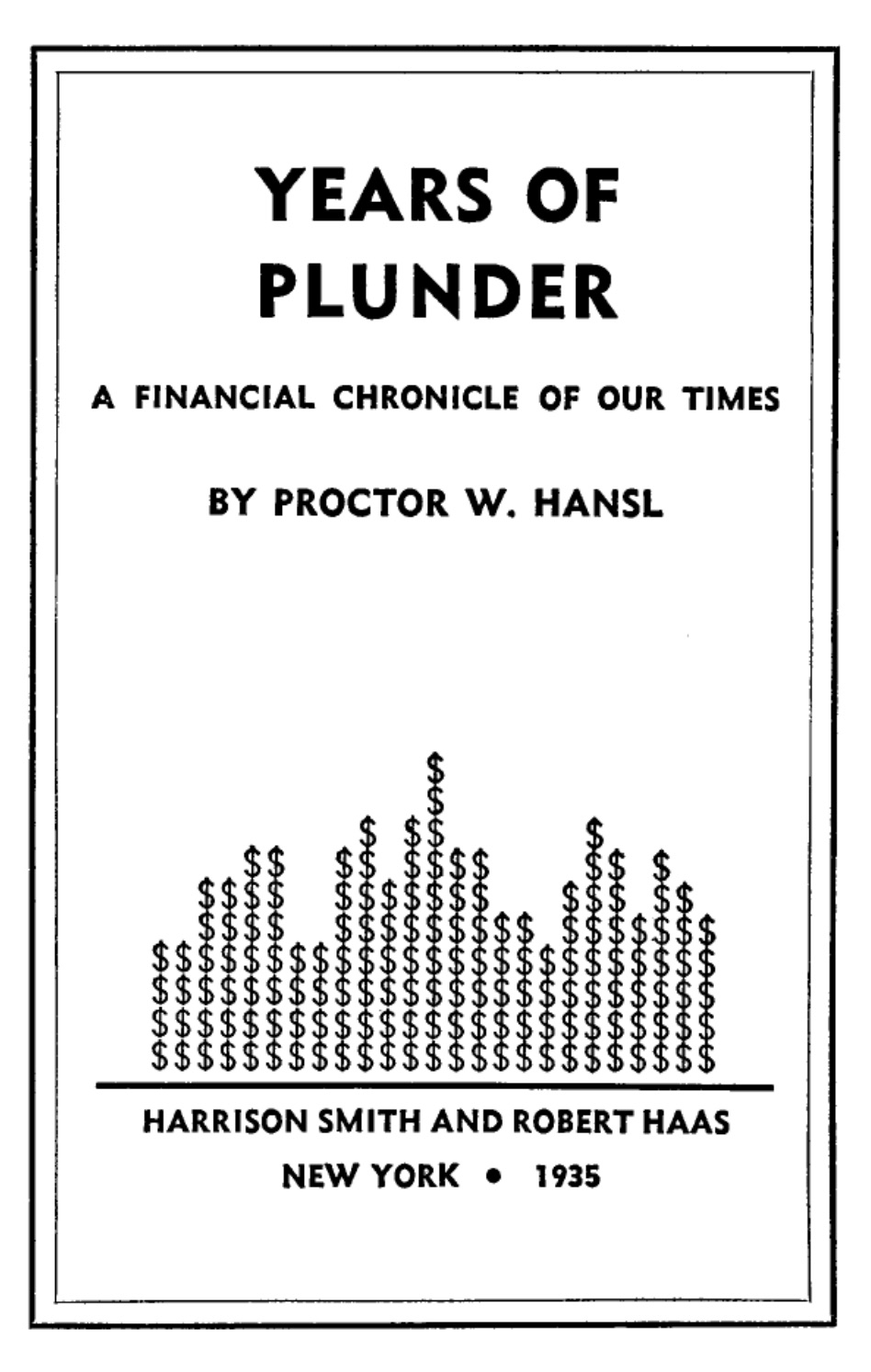Proctor W. Hansl
Years of Plunder: A Financial Chronicle of Our Times (1935)

Foreword - New Ways For Old
SINCE the turn of the century it has been an open question in America whether Business would devour Government or Government would devour Business. During the first half of this period the trend was toward the emergence of Business as the dominant factor. During the latter half the trend has been in the opposite direction. The dividing line was, of course, the war, when for the first time the government assumed complete control of industry.
Relinquishing this control after the war, under the benign influence of the Reign of Normalcy, the government afforded business an opportunity to re-establish itself. It failed. Caught in the maze of a vast inflation of credit, ‐instigated by Wall Street and carried out with the aid of Washington‐business succumbed to the mania of speculation and emerged disrupted and discredited. It is to be doubted that it will ever be trusted to take the helm again.
As we look back over the years that have come and gone since the beginning of the century, the year 1917 assumes an epochal significance. In a real sense it marked the end of the old order. With o u r entrance into the World War the New Freedom of Woodrow Wilson became an actuality.
Before this the government had been largely in the hands of Big Business. Convinced of its righteousness, honestly enough, it set out to mold the social and economic order in its own image and, to a large extent, it succeeded. Despite the growing rumblings of discontent, despite the opposition of such a formidable force as the first Roosevelt, it succeeded on the whole in making the rich richer, whether or not it made the poor poorer.
For a decade and a half, under the tutelage first of Mark Hanna and later with the aid of Speaker Joe Cannon and Senator Aldrich‐twin guardians of the old order‐Big Business made unprecedented gains. It consolidated its position. It imposed its philosophy of Rugged Individualism on a complacent world, and in its name it extended the scope of Monopoly and broadened the realm of Privilege. Through an unconscionable tariff system it added immeasurably to manufacturing profits and placed a back-breaking burden on consumers.
Through legal trickery or outright seizure it took over the public domain and acquired timber, mineral and water power rights which were a part of the nation’s heritage. Through bribery or political influence it acquired municipal railway and gas or electric power franchises, as in a previous era it had obtained railroad rights and had built great systems on borrowed money at costs which were inflated to cover vast construction profits for the promoters and then casually wrecked these systems and bought them back at a fraction of their original cost. Through secret shipping or price agreements it crushed competition and destroyed its rivals. In the race for wealth it adulterated foods, falsified advertising and oppressed labor and in every field it opposed to the last ditch any reform that threatened to cut into profits or lessen the power of Privilege. When occasion demanded or profit dictated it wrecked banks, looted insurance companies and fostered panic‐all in the name of Rugged Individualism. Then, as a final gesture it dumped its ill-gotten gains and tainted properties into the hopper of Wall Street and emerged with vast holdings of watered stock, which it manipulated to its own profit and to the undoing of small investors and ignorant speculators.
“In the end”, as a keen British observer, Bertrand Russell, recently wrote,* “America became, in its economic life, an organized whole ruled, for their own profit, by a handful of rich men”.
In other words, a system of Organized Plunder.
But the dictators of the old order reckoned without the war and the war wrecked their machine. Commandeering their plants and means of transportation, largely through the instrumentality of their own paid executives, the government took over industry and turned it to the uses of war. Not only that, but it did a remarkably fine job, shattering f o r once the illusion that Government was incapable of functioning efficiently in the field of private business. When the w a r ended the government handed back to private capital a well-oiled machine, which, however, was geared up to a production capacity that in time spelled the ruin of industry. For when the short-lived post-war spurt of prosperity had spent itself Big Business was faced with the alternatives of drastic liquidation or inflation on a grand scale. Unwisely it chose inflation and for seven mad years kept the ball spinning at an ever-increasing speed in a hope‐ less effort to save itself. Buoyed up by rampant speculation and cheered on by the vociferous disciples of the New Economic Era philosophy, it appeared for a time that it might succeed; in fact, it was almost convinced of the efficacy of its own nostrums, but in the end came collapse and business, big and little, found itself prostrate.
That business has fallen from its high estate is due not so much to ruthlessness of purpose as to an inherent weakness in its philosophy. Like the Profits System, which is its economic counterpart, individualism is wholly a philosophy of self-seeking. Ignoring the fact that self-seeking leads to greed and greed to injustice and injustice to retribution, we have sought to rear an economic order which contains within itself the seeds of destruction. For it is impossible to build a world that is fit to live in or a civilization that will endure on the basest human vices or passions.
But, say the defenders of the old order, it worked. All about us are the evidences of material wealth and progress. Look at the skyscrapers, subways, magnificent parks and homes. See the automobiles and radios in the hands of working folk. Has any other system ever done so much for the common man?
For the sake of argument, let us grant that it worked ‐ u p to a certain point. But in the interest of truth let it also be recorded that when the first real test came it failed miserably. This is perhaps the greatest lesson of the Depression.
As a matter of plain fact, if one cared to argue the point, it is a question whether the system ever really worked. It all depends on whether one looks at the scene from the standpoint of 1929, with a national income of 85 billion dollars, or from the standpoint of 1933, when the national income had dropped some 40 billion dollars with a corresponding decrease in living standards. It depends on whether one stands in the place of the farmer, who had faced declining prices and in‐ creasing costs for a decade or more, and the wage earner, whose gross earnings had continuously fallen during the same period, or whether one stands in the place of the investor or speculator, whose dividends and profits had mounted steadily. It was the curse of the so‐ called prosperity of the Twenties that it was distributed with glaring unevenness. In some fields it was a glittering reality; in others it was palpably lacking.
The essence of the theory behind the Profits System is the accumulation of profits at the top. It is true that, within limitations, its beneficiaries are willing to share their gains. In the interest of larger profits they will allow some small part of their wealth to “trickle down” to those at the bottom in the form of a living wage. But this is Feudalism‐with this exception: that in a feudal state the Great Lord assumes responsibility for the lives and property of his retainers, whereas under the existing system they are ever at the mercy of the capricious Winds of prosperity. Obviously to attempt to establish an Industrial Feudalism within the scope of a Political Democracy is a contradiction in terms. One must yield to the other. Either we will have to get rid of democracy and accept autocracy‐which is another word for Fascism‐or we will have to get rid of economic feudalism and accept the principle of govern‐ m e n t control of industry‐otherwise known as regimentation. The sole remaining alternative is collectivism, which thinking people are not prepared to accept, in America at least.
But we are getting into deep water. Let us return to the government. Under the NRA it is evident that at last Government has swallowed Business and in order to wash down its meal it has taken some potent draughts on the side in the form of other activities of the New Deal. Whether this is for good or ill, it is too early to say, but, as a choice between evils, there is a growing body of opinion which holds that it is the sounder course.
From the practical standpoint, can the new system be made to work? Will it stand the pragmatic test? Why not? its supporters ask. All that they are attempting to do is to set up a planned economy in place of a “hit-or‐miss” economy. We are not attempting, they argue, to subvert existing institutions. We do not propose to do away with the right of private property. It is possible, they admit, that they will exalt human rights, but that is not to say that they will destroy property rights, except perhaps insofar as they are anti-social. Nor do they seek to change the processes of government. They accept the Constitution and propose to live under it. Is this subversive? Is it unsound or unpractical?
But, notwithstanding this, it is not to be denied that the philosophy of the New Deal runs directly counter to that of the old order. In fact, there are signs that the new leadership is preparing to discard the Profit motive as a determining factor in its economics. Fortunately, it holds, there are other motives that will serve the same purpose more effectively and more humanely. There is, for example, the Security motive. If we can once convince ourselves that the security of all means the security of each and every one it is possible that we will find a common ground on which government and industry can meet.
Certain it is that the desire for security, or the instinct of self-preservation, is the deepest human instinct. To deny this or to say, as the old order does, that the predatory instinct‐which is the biological equivalent of the Profit motive ‐ is the primary impulse of natural man is founded neither on fact nor on human experience. In his natural state man was not a hunter‐he was the hunted. The Hunting Stage of mankind was a super‐imposed culture which was destined to go the way of other cultures, and to attempt to build an economic system on this discarded remnant of a dead past is an anacronism. Worse than that, it is a reversion to the “reign of tooth and claw”.
Downloads and Links
- Download Years of Plunder: A Financial Chronicle of Our Times (1935) by Proctor W. Hansl - PDF (28.8 MB) - 307 pages.
- Read Years of Plunder: A Financial Chronicle of Our Times on The Internet Archive and download in different formats
- Web search for the book by ISBN:9781287638827
- Web search for the book by author and title
